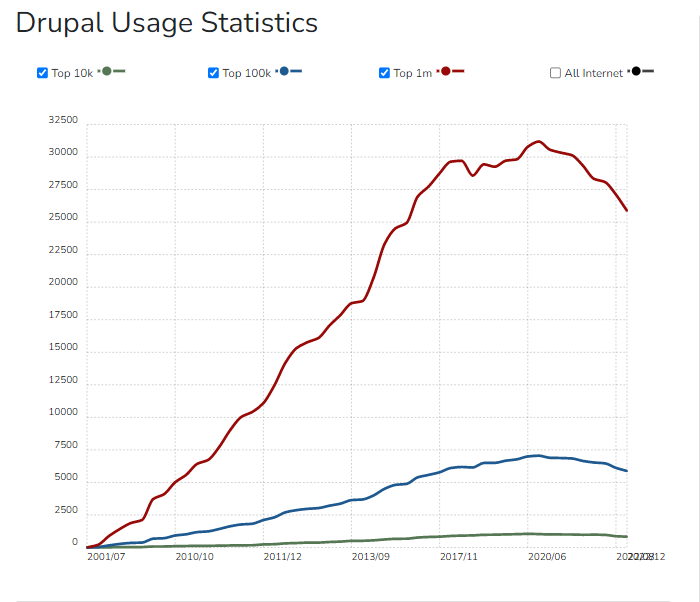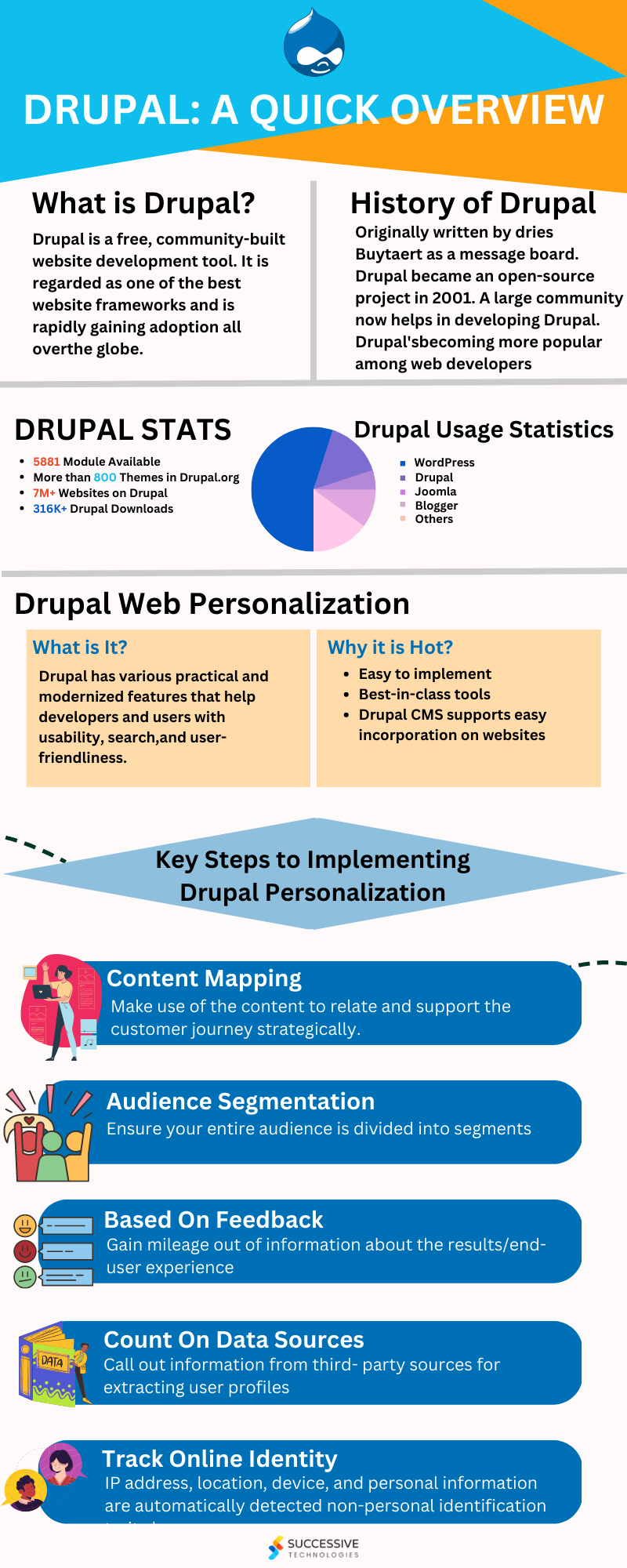For many businesses, Drupal is rapidly becoming a favorite development tool. However, Drupal is a tool that takes work to learn or use. It requires a different way of thinking compared to most other development platforms. This means that any Drupal developer will have to undergo training in order to be effective. This blog will provide you with a guide to Drupal Development, the things you need to do, the various tools, and other tips.
What is Drupal?
Drupal is an open-source content management system (CMS) written in PHP. It is used to build websites and web applications and is designed to be flexible and scalable. The record shows 1,748,869 Drupal customer websites, including 587,451 live sites and 1,161,418 historical ones. Additionally, there are 227,733 Drupal sites in the United States.

Drupal provides a web-based interface for managing content, including articles, images, and other multimedia elements, as well as custom content types, taxonomies, and user management. It also has robust features for managing user roles and permissions and supports multiple languages and content translations.
Drupal also has a large and active community of developers and users who contribute to the platform through modules, themes, and other extensions that add functionality and customization options. Some popular Drupal modules include Views, which provides a way to build and display lists of content, and the Panels module, which allows for flexible layout and design options.
One of the critical strengths of Drupal is its security and stability. The Drupal security team is active and highly responsive, and regular security updates are released to address vulnerabilities as they are discovered. Additionally, Drupal has been adopted by many high-traffic websites and organizations, including NASA, Amnesty International, and the White House, making it a trusted and reliable platform for web development.
What is Drupal Used For?
Drupal is a content management system (CMS) used to build and manage websites and web applications. It is used for a variety of websites, including personal blogs, corporate websites, government websites, e-commerce sites, and more. Some key features and uses of Drupal include:
Content creation and management: Drupal provides a web-based interface for creating and managing various types of content, such as articles, images, videos, and custom content types.
User management: Drupal offers a robust set of tools for managing user roles and permissions, including creating custom roles, assigning permissions, and managing user profiles.
Design and customization: Drupal has a large and active community of developers and users who contribute to the platform through modules, themes, and other extensions, providing a wide range of customization options for design and functionality.
Multi-language support: Drupal supports multiple languages and content translations, making it a good option for websites with a global audience.
E-commerce: Drupal can be used to build e-commerce websites, with various modules and extensions available for handling product catalogs, shopping carts, and payment processing.
Drupal is a flexible and scalable platform widely used for various websites and web applications due to its features, security, and stability.
Benefits of Drupal Development Services for business
There are several benefits of using Drupal web development services for business:
- Scalability: Drupal is designed to be flexible and scalable, making it a great option for businesses that expect to grow and expand their online presence over time.
- Security: Drupal has a strong focus on security, with regular security updates released to address vulnerabilities as they are discovered. This makes it a reliable and secure platform for businesses of all sizes. It is considered the primary drupal benefit for businesses.
- Customization: Drupal has a large and active community of developers and users who contribute to the platform through modules, themes, and other extensions. This provides businesses with a wide range of customization options for design and functionality.
- Multi-language support: Drupal supports multiple languages and content translations, making it a good option for businesses with a global audience.
- E-commerce: Drupal can be used to build e-commerce websites, with various modules and extensions available for handling product catalogs, shopping carts, and payment processing.
- Search engine optimization (SEO): Drupal has built-in SEO features and can be easily extended with modules to provide advanced SEO capabilities, making it easier for businesses to improve their search engine rankings.
- Cost-effectiveness: Drupal is an open-source, free-to-use, and customized platform. This can result in significant cost savings compared to other proprietary platforms.
- Ease of use: Drupal is designed to be user-friendly and intuitive, which makes it easy for non-technical users to create and manage their websites. This makes it an excellent choice for businesses that want to build a website without hiring a team of developers.
Steps Involved in Creating a Drupal Website
Here, let’s accept that advancement is a must for everything. The below steps of creating a Drupal website can differ depending upon the version of Drupal.
Here are the general steps involved in creating a Drupal website:
Plan your Website: Determine your website’s goals, target audience, content, and overall design.
Choose a Hosting Provider: Choose a hosting provider that meets your needs in terms of performance, security, and support.
Install Drupal: Follow the steps to install Drupal on your web server or use a web hosting provider that offers a one-click Drupal installation.
Drupal Theme Development: Choose a Drupal theme that fits your website’s design and functionality needs.
Configure Basic Settings: Configure the basic settings for your Drupal websites, such as the site name, default language, and time zone.
Create Content: Create the content for your website, including pages, articles, images, and other media.
Install Modules: Install Drupal modules to add functionality to your website, such as contact forms, e-commerce, and more.
Configure Security: Configure the security settings for your Drupal website, including user roles and permissions, and take other measures to secure your site.
Test and Launch: Test your Drupal website thoroughly and make any necessary adjustments. Launch your website and promote it to your target audience.
Maintain and Update: Regularly maintain and update your Drupal website, including updating modules, themes, and the Drupal core, to ensure the site remains secure and up-to-date.
These steps may vary slightly depending on the specific requirements of a Drupal project. However, following these steps will provide a general roadmap for creating a Drupal website.
Key Consideration While Developing Drupal Website
When developing a Drupal website, there are several key considerations to keep in mind:
User Experience (UX): Ensure the website is user-friendly, intuitive, and accessible, with a clear and consistent design.
Content Strategy: Plan and organize the content for your website, including the structure, hierarchy, and navigation.
Performance: Ensure that your Drupal website is fast, reliable, and optimized for desktop and mobile devices.
Security: Implement robust security measures, including frequent updates and backups, to keep your website and its data secure.
Scalability: Design and build your Drupal website with scalability in mind, so it can grow and evolve as your business grows.
Search Engine Optimization (SEO): Optimize your Drupal website for search engines, including using meta tags, descriptive URLs, and other best practices.
Responsiveness: Make sure your Drupal website is responsive, adjusting its layout and content to fit different screen sizes and devices.
Accessibility: Ensure that your Drupal website is accessible to users with disabilities, including providing alternative text for images and following web accessibility guidelines.
Integration: Consider integrating your Drupal website with other systems and platforms, such as CRMs, social media, and e-commerce platforms.
User management: Implement a user management system for your Drupal website, including user registration, roles and permissions, and password policies.
These key considerations should be considered when developing a Drupal website to ensure a successful project outcome.
A Few of the Top Drupal Websites Are
Drupal is a widely used content management system (CMS) for creating dynamic websites. It is known for its versatility, scalability, and security. Some of the top Drupal websites include Tesla, a leading electric vehicle manufacturer; Nokia, a multinational telecommunications company; Oxford University, one of the oldest and most prestigious universities in the world; The European Community, a political and economic union of 27 European countries; and The Australian Government, which serves as the official website for the Australian government. These organizations trust Drupal to power their online presence due to its ability to meet their unique requirements and provide a seamless user experience.
Which to choose: Drupal vs WordPress
The choice between Drupal vs WordPress depends on a project’s specific needs and requirements. Here are some factors to consider:
- Purpose: WordPress is primarily designed for building simple to complex blogs and websites, while Drupal is a more robust and scalable platform for building complex web applications.
- Customization: WordPress has a large selection of themes and plugins, making it easy to customize the look and feel of a website. On the other hand, Drupal has a more extensive range of modules and themes and is a better option for building complex and custom web applications.
- Security: Drupal and WordPress are secure platforms, but Drupal has a stronger focus on safety and a more active security team, making it a better option for large and mission-critical websites.
- Ease of Use: WordPress is known for its ease of use, simple and intuitive interface, and large user community. Drupal, while more complex, provides more advanced features and customization options.
- Scalability: Drupal is designed to be scalable and flexible, making it a good option for businesses that expect to grow and expand their online presence over time. WordPress can also scale but may require more technical expertise and additional plugins.
The choice between Drupal and WordPress depends on a project’s specific needs and requirements. For simple blogs and websites, WordPress may be the better choice, while for complex web applications, Drupal may be a better option.
Must Read: Adobe Commerce (Magento) vs Shopify: Which eCommerce Platform Is Best?
Why Need to Hire a Drupal Development Company?
Hiring a Drupal development company can offer several benefits to organizations and businesses that need to create or improve their website. Here are a few reasons why you might need to hire a Drupal development company:
Expertise and experience: A Drupal development company has the expertise and experience in working with Drupal and can provide you with a high-quality, professional website that meets your specific needs and requirements.
Time savings: Hiring a Drupal web development company can save you time and effort in creating a website, as the company can handle the technical aspects of the project, allowing you to focus on other aspects of your business.
Cost savings: A Drupal website development company can provide cost savings compared to hiring an in-house team, as it eliminates the need for recruiting, training, and managing an internal team.
Customization and scalability: A Drupal development company can provide customization and scalability to your website, ensuring it meets your current and future needs.
Security and maintenance: A Drupal web development company can provide ongoing security and maintenance support for your website, ensuring it remains secure, up-to-date, and functional.
Professionalism and quality assurance: A Drupal development company can provide a professional website that meets your standards and expectations, with quality assurance processes in place to ensure a successful project outcome.
Hiring a Drupal development company can provide many benefits, including expertise, time and cost savings, customization and scalability, security and maintenance, and professionalism and quality assurance.
Also Read: How to Choose the Best Magento(Adobe Commerce) Development Company
How to Hire Best Drupal Service Providers?
Here are some steps to follow when hiring the best Drupal service providers:
- Define your needs and requirements: Clearly define the goals, objectives, and requirements of your Drupal project, including the features, functionality, and design you need.
- Research potential Drupal service providers: Search for Drupal service providers with experience and expertise in the specific needs of your project. Check their portfolios, reviews, and references to get a sense of their quality of work.
- Evaluate their expertise and experience: Evaluate the expertise and understanding of the Drupal service providers you are considering, including their knowledge of Drupal, their technical skills, and their past projects.
- Ask for references: Ask for references from the Drupal service providers you are considering, and speak to their past clients to get their feedback on their work.
- Review their communication and collaboration skills: Good communication and collaboration skills are critical for a successful project. Ensure the Drupal service providers you are considering have a straightforward and effective communication process.
- Discuss project scope and timeline: Discuss the scope and timeline with the Drupal service providers, including the deliverables, milestones, and deadlines.
- Evaluate their pricing and payment terms: Evaluate the pricing and payment terms of the Drupal service providers, including their fees, expenses, and payment schedule.
- Choose the best Drupal service provider: Choose the one that best meets your needs, requirements, and budget and that you feel confident will provide you with a successful project outcome.
By following these steps, you can hire the best Drupal web development company for your project, ensuring a successful project outcome and a high-quality, professional website.
Final Takeaway
The vast majority of you reading this article have probably already made up your mind about whether or not Drupal is suitable for your next project. But if you’re still on the fence, I’d say it’s worth considering what kind of website(s) could be built with this technology and what benefits they would bring. You might discover many ways Drupal can be used with other technologies, so don’t be afraid to experiment!













